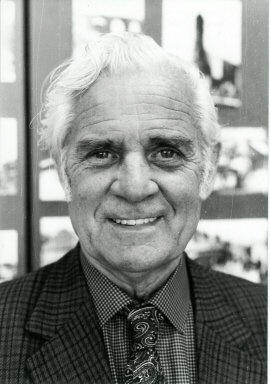 |
|||
|
Another Hooley |
|||
|
...Yes, and grandson of the "notorious" Job Hooley, mentioned elsewhere on these pages. Later in his life Jim became a celebrated local historian in Stockport, author of 11 meticulously researched books and manuscripts produced over the course of many years of historical research. Unlike Job, he was much more interested in letting the world know about his life and times, and after producing several works about the history of Stockport he decided to put pen to paper to record his own, more personal story in A Hillgate Childhood. |
|||
Jim Hooley 1913-2003
|
|||
| Introduction and Historical note. | |||
| Before Wellington Road (now the A6) was built in the early
nineteenth century, the main London to Manchester Road ran through
Stockport via Hillgate. Straddling the river Mersey, on the Cheshire-Lancashire
border, the manufacturing town’s economy had boomed during the Industrial
Revolution. A profusion of workers' dwellings had been built
in the area between the old and new roads, to serve the burgeoning
factories and cotton mills. Mottram Street was
typical of the district; a poor area with rows of two-up-two-down terraced
houses and a high proportion of unskilled Irish immigrant residents. James
Hooley was born at number 36 on November 15th 1913; the sixth child of
seven born to George and Annie Hooley.
In common with many families in this area, the Hooleys had a largely Irish
ancestry, and the whole family was Roman Catholic. It was the fourth year of the reign of George the fifth, and Britain was on the brink of the Great War; which would for so many people mean “the end of an era”. Unfortunately, despite the fact that the Liberal government had introduced a remarkable programme of social welfare - including for the first time contributory sickness and unemployment schemes: – for the majority of poor Hillgate families, their lives would seem much the same after the 1914-18 war, as before it. Nationally, social conditions were undoubtedly improving, and successive acts of parliament from the late nineteenth century onward had improved welfare, education and life expectancy but tangible material benefits were painfully slow to permeate down to those at the bottom of the ladder. The Hooley family, and thousands like them, were more concerned with obtaining a steady wage and food for the family than in the latest civic improvement scheme. Quite apart from families struggling to cope with the loss of fathers, brothers and sons during the Great War; those whose relatives returned faced their own problems. Not the least of these were the basic necessities of finding work, and keeping a roof over their heads. Because of reduced demand, and for the first time, foreign competition, many of Britain’s staple industries were in decline, and this hit the economy of textile producing towns such as Stockport hard. Unemployment climbed, and peaked nationally at 22.5 % in the early 1930’s; but the figures were much worse in the hard hit north west of England. This was the background that Jim Hooley grew up in, and which many years later he recalled by writing an amusing and affectionate reminiscence of a life that despite it’s hardships, could still make you smile. The scenes he describe seem a million miles away now, and it is amazing that these characters and places he remembers really existed. Because I think it is a story worth telling, and because all these unknown ordinary people, remarkable and unique, deserve to be remembered, I am posting this story here. The style is colloquial, and the words have been kept exactly as Jim wrote them. Only minor punctuation changes to the text have been made, where necessary, for clarity, but that is the extent of my meddling. Jim Hooley was my grandfather. He lived in Stockport throughout his life, and despite ill health that made it necessary for him to take early retirement from his job as a gas fitter, he carried on local history research in the town for many years. He was an active member of Stockport Historical Society throughout this time, and apart from his writing, he was also interviewed many times by the press, and made appearances on local radio and television. Continuing health problems and failing eyesight meant that he eventually had to give up his research work altogether, but his interest in the history of Stockport never wavered. He would have been thrilled to hear, though I don't think he was ever aware, of a report in the Stockport Express, 19th February 2003 of plans for the regeneration of what was left of his beloved Hillgate "...Stockport Council won the funding to regenerate the Hillgate conservation area...The funding will be matched with monies from the council and the government’s Single Regeneration Budget, making a total of at least £3 million to be invested in the scheme...1" Unfortunately Jim died in June 2003, aged 89. Julie Kimpton. |
|||
| Original Preface | |||
Hillgate at this present time seems to
me to be a quiet and strange place, with its high tower blocks, few shops
and deserted streets. A place far removed from the district of my
childhood and youth – a bustling thriving community where friends could be
found at every street corner. It is with mixed feelings that I walk down
Hillgate and remember those days and the characters who could be found in
the pubs and on the streets. The housewives, overworked and “hard done by”
but always cheerful in spite of the invariably grim future. Their
children, many under-nourished and without the advantages and benefits of
children today, but finding friendship and comradeship in the cramped
streets and backyards. With this picture in mind I put pen to paper and
try to recapture those days.Jim Hooley. Stockport, 1981
|
|||
|
|
|||
